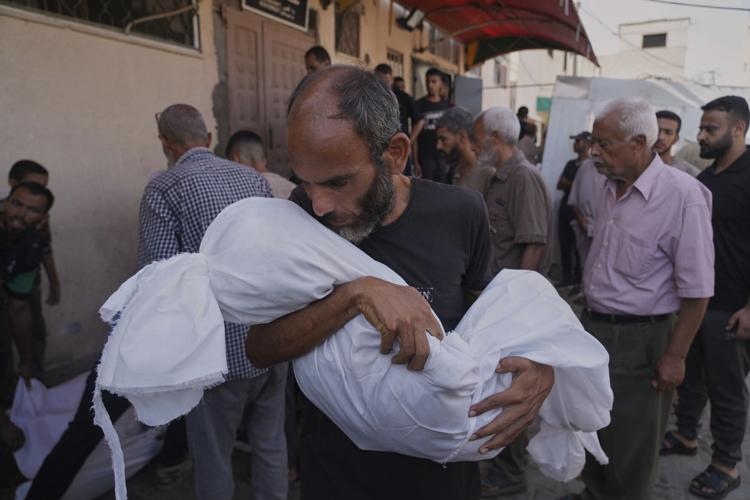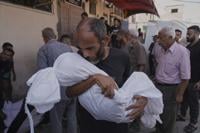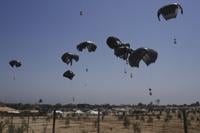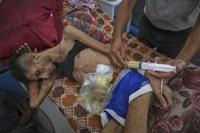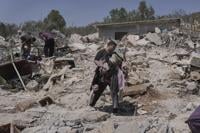JERUSALEM (AP) — A key mediator on Tuesday stressed the urgency of brokering a ceasefire in Gaza after Hamas showed a “positive response” to a proposal, but Israel has yet to weigh in as its military prepares an offensive on some of the territory's most populated areas.
The prospect of an expanded assault on areas sheltering hundreds of thousands of civilians has sparked condemnation inside Israel and abroad. Most war-weary Palestinians see no place in Gaza as safe, not even declared humanitarian zones, after 22 months of war.
Many Israelis, who rallied in the hundreds of thousands on Sunday, fear the offensive will further endanger the remaining hostages in Gaza. Just 20 of the 50 remaining are thought to be alive.
“If this (ceasefire) proposal fails, the crisis will exacerbate,” Majed al-Ansari, a spokesperson for Qatar's foreign ministry, told journalists, adding they have yet to hear from Israel on it.
Witkoff is invited to rejoin the talks
Qatar is among the countries mediating to end the war. Al-Ansari said Hamas had agreed to terms under discussion. He declined to provide details but said the proposal was “almost identical” to one previously advanced by U.S. envoy Steve Witkoff.
That U.S. proposal was for a 60-day ceasefire, during which some of the remaining hostages would be released and the sides would negotiate a lasting ceasefire and the return of the rest.
“If we get to a deal, it shouldn’t be expected that it would be instantaneously implemented,” al-Ansari said. “We’re not there yet.”
That cautious assessment came a day after the foreign minister of Egypt, another mediator, said they were were pushing for a phased deal and noted that Qatar's prime minister had joined the talks between Hamas leaders and Arab mediators.
Witkoff has been invited to rejoin the talks, Egyptian Foreign Minister Badr Abdelatty told The Associated Press. Witkoff pulled out of negotiations less than a month ago, accusing Hamas of not acting in good faith.
It was not clear how Witkoff has responded to the invitation.
An Israeli official on Monday said the country's positions, including on the release of all hostages, had not changed. The official spoke on condition of anonymity because they were not authorized to speak with the media.
Prime Minister Benjamin Netanyahu has said a final push is needed to “complete the defeat of Hamas" He has vowed to continue the war until all the hostages are returned and Hamas has been disarmed.
28 Palestinians killed in Gaza
Hospitals in Gaza said they had received the bodies of 28 Palestinians killed Tuesday, including women and children, as Israeli strikes continued across the territory. Among them were nine people killed while seeking aid, officials at two hospitals told The Associated Press.
The deaths were recorded across Gaza, including in central Deir al-Balah, southern Khan Younis and near aid distribution points, hospital officials said.
The Gaza Humanitarian Foundation, an Israeli-backed private American contractor that has become the primary distributor of aid in Gaza since May, operates those sites.
Nasser Hospital also said an airstrike killed a mother, father and three children in their tent overnight in Muwasi, a camp for hundreds of thousands of civilians.
“An entire family was gone in an instant. What was their fault?” the children’s grandfather, Majed al-Mashwakhi, said, sobbing.
Neither the GHF nor Israel’s military immediately responded to questions about the casualties reported by Nasser, Awda and al-Aqsa hospitals.
The Palestinian death toll in the war surpassed 62,000 on Monday, according to Gaza’s Health Ministry, which is part of the Hamas-run government and staffed by medical professionals. The ministry does not say how many of the dead were civilians or combatants, but says women and children make up around half of them.
In addition to that toll, other Palestinians have died from malnutrition and starvation, including three reported in the past 24 hours, the ministry said Tuesday. It says 154 adults have died of malnutrition-related causes since late June, when it began counting such deaths, and 112 children have died of malnutrition-related causes since the war began with the Hamas-led attack on Israel on Oct. 7, 2023.
Aid groups continue to struggle to deliver supplies to Gaza. Israel imposed a full blockade in March, then allowed limited aid to resume two and a half months later. The Israeli military body in charge of humanitarian aid to Gaza, COGAT, said 370 trucks of aid entered Tuesday — still below the 600 per day that the United Nations and partners say is needed.
A new attempt to deliver aid by sea
Israel has controlled all Gaza border crossings since seizing the Palestinian side of Rafah in May 2024. With land routes restricted, aid groups have attempted to deliver supplies by air and sea.
COGAT said Tuesday that 180 pallets of aid were airdropped into Gaza with help from countries including Jordan, the United Arab Emirates and France. The U.N. and partners have called airdrops expensive, inefficient and even dangerous for people on the ground.
A ship carrying 1,200 tons of food left Cyprus on Tuesday for the Israeli port of Ashdod loaded with pasta, rice, baby food and canned goods that were pre-screened in Cyprus.
Magdy reported from Cairo and Gambrell from Dubai, United Arab Emirates. Melanie Lidman contributed from Tel Aviv, Israel.
Follow AP’s war coverage at https://apnews.com/hub/israel-hamas-war


